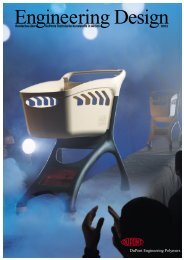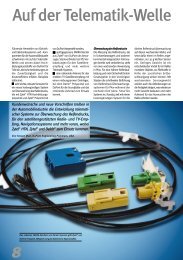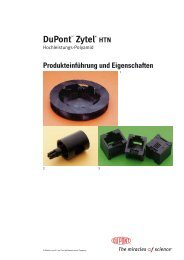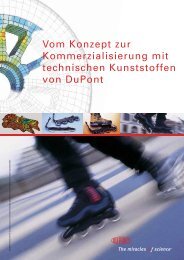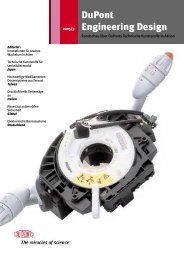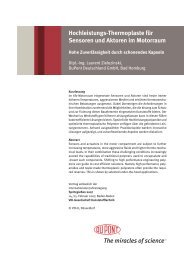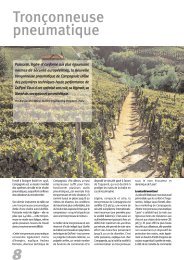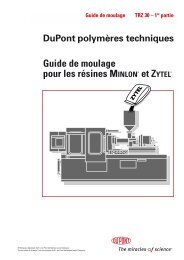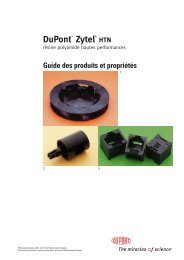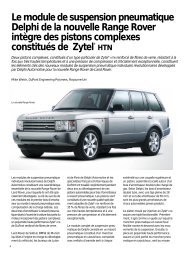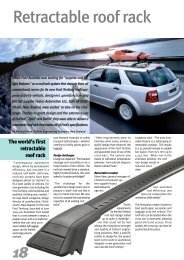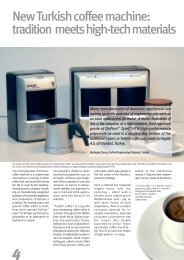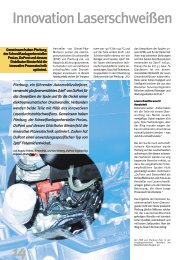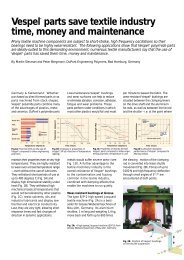General Design Principles for DuPont Engineering Polymers - Module
General Design Principles for DuPont Engineering Polymers - Module
General Design Principles for DuPont Engineering Polymers - Module
Create successful ePaper yourself
Turn your PDF publications into a flip-book with our unique Google optimized e-Paper software.
It is essential to measure and adjust the correct backlash<br />
at operating temperature and under real working<br />
conditions. Many gears, even though correctly designed<br />
and molded fail as a result of incorrect backlash<br />
at operating conditions. In particular, the designer<br />
must be aware that backlash may be adequate after a<br />
device is assembled, but may change in time and<br />
under working conditions due to the following reasons:<br />
• Thermal variations<br />
• Post molding shrinkage<br />
If the gear box is molded in a plastic material as well,<br />
the same considerations apply. Center distance may<br />
vary and influence backlash, thus the dimensional<br />
stability characteristics of the housing material must<br />
be considered.<br />
Increased backlash causes the gears to mesh outside<br />
the pitch diameter resulting in higher wear. Insufficient<br />
backlash may reduce service life or even cause<br />
seizing and rapid part destruction.<br />
It is often easier to determine center distance after<br />
having produced and measured the gears. It must be<br />
kept in mind that this procedure may produce more<br />
wear as the gears may no longer mesh exactly on the<br />
theoretical pitch circle.<br />
Mating Material<br />
The coefficient of friction and wear factor of Delrin ®<br />
acetal resin on Delrin ® acetal resin are not as good as<br />
Delrin ® acetal resin on hardened steel, <strong>for</strong> example.<br />
Even so, a great number of commercial applications<br />
have entire gear trains made of Delrin ® acetal resin<br />
(especially appliances and small precision speed<br />
reducers <strong>for</strong> clocks, timers, and other mechanical<br />
devices).<br />
• If two meshing gears are molded in Delrin ® acetal<br />
resin, it does not improve wear to use different<br />
grades, as <strong>for</strong> instance, Delrin ® 100 and Delrin ®<br />
900 F or Delrin ® 500 CL.<br />
• In many cases wear can, however, be significantly<br />
improved by running Delrin ® acetal resin against<br />
Zytel ® nylon resin. This combination is especially<br />
effective where long service life is expected, and<br />
shows considerable advantage when initial lubrication<br />
cannot be tolerated.<br />
• In all cases, where two plastic gears run together,<br />
allowances must be made <strong>for</strong> heat dissipation. Heat<br />
dissipation depends on the overall design and<br />
requires special consideration when both materials<br />
are good thermal insulators.<br />
• If plastic gears run against metals, heat dissipation is<br />
much better, and consequently a higher load can be<br />
transmitted. Very often, the first pinion of a gear<br />
train is cut directly into the fast running motor shaft.<br />
Heat transmitted through the shaft from the bearings<br />
58<br />
and electric coils can raise the gear teeth temperature<br />
above that which might be expected. The<br />
designer should pay particular attention to adequate<br />
motor cooling.<br />
• Gear combinations of plastic and metal may per<strong>for</strong>m<br />
better and show less wear than plastic on plastic.<br />
This is, however, only true if the metal gear has a<br />
hardened surface.<br />
Lubrication<br />
Experience has shown that initial lubrication is<br />
effective <strong>for</strong> a limited time. Units disassembled after<br />
completion of their service life showed that all the<br />
grease was thrown on the housing walls; hence the<br />
gears ran completely dry. Initial lubrication does not<br />
allow a high load, it should be considered as an<br />
additional safety factor. It should, however, always be<br />
provided as it helps greatly during the run-in period.<br />
On applications where lubricants cannot be tolerated,<br />
the combination of Delrin ® acetal resin and Zytel ®<br />
nylon resin offers great advantages. Even under dry<br />
conditions such gear trains run smoothly and with<br />
little noise.<br />
Where continuous lubrication of gears in Delrin ®<br />
acetal resin and Zytel ® nylon resin is practical, and<br />
where surface pressure on the meshing teeth is not<br />
excessive, wear is negligible and service life is<br />
determined exclusively by fatigue resistance.<br />
Testing Machined Prototypes<br />
Though it would appear that the easiest way to determine<br />
whether a proposed gear will show the expected<br />
per<strong>for</strong>mance would be to test machined prototypes,<br />
results thus obtained must be interpreted with great<br />
care. A designer has no guarantee that a subsequently<br />
molded gear will have the same per<strong>for</strong>mance characteristics.<br />
There<strong>for</strong>e no final conclusion can be drawn<br />
from test results using machined gears. Making a trial<br />
mold is the only safe way to prototype a gear design.<br />
It allows not only meaningful tests but also the<br />
measurement of shrinkage, tooth profile, pitch diameter<br />
and overall accuracy.<br />
It is highly recommended to check tooth quality on a<br />
profile projector which enables detection of deviation<br />
from the theoretical curve.<br />
Prototype Testing<br />
The importance of adequate testing of injection<br />
molded prototype gears has been emphasized. Here<br />
are some guidelines:<br />
Accelerated tests at speeds higher than required of a<br />
given application are of no value. Increasing temperature<br />
above normal working temperature may cause



